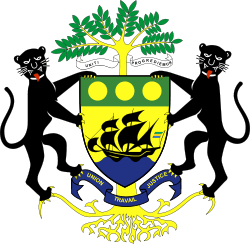Foreign relations of Gabon
 |
| This article is part of a series on the politics and government of Gabon |
|
|
Politics portal |
Gabon has followed a non-aligned policy, advocating dialogue in international affairs and recognizing both parts of divided countries. Since 1973, the number of countries establishing diplomatic relations with Gabon has doubled. In inter-African affairs, Gabon espouses development by evolution rather than revolution and favors regulated free enterprise as the system most likely to promote rapid economic growth. Concerned about stability in Central Africa and the potential for intervention, Gabon has been directly involved with mediation efforts in Chad, Central African Republic, Republic of Congo, Angola, and former Zaire. In December 1999, through the mediation efforts of President Bongo, a peace accord was signed in the Republic of Congo between the government and most leaders of an armed rebellion. President Bongo has remained involved in the continuing Congolese peace process. Gabon has been a strong proponent of regional stability, and Gabonese armed forces played an important role in the UN Peacekeeping Mission to the Central African Republic (MINURCA).
Gabon is a member of the UN and some of its specialized and related agencies, including the World Bank; Organisation of African Unity (OAU); Central African Customs Union (UDEAC/CEMAC); EC association under Lome Convention; Communaute Financiere Africaine (CFA); Organisation of Islamic Cooperation (OIC); Non-Aligned Movement; withdrew from the Organization of Petroleum Exporting Countries (OPEC).
Gabon is also a member of the International Criminal Court with a Bilateral Immunity Agreement of protection for the US-military (as covered under Article 98).
Bilateral relations
Canada
Canada established diplomatic relations with Gabon in 1963. Gabon is represented in Canada by an Embassy in Ottawa.
Since 2003, Canada has also been working with Gabon in the Group of Friends of the Great Lakes Region, which Canada co-chairs, in support of the International Conference on the Great Lakes Region.
China
On April 20 1974, China established diplomatic relations with Gabon.[1]
Equatorial Guinea
Gabon is involved in a maritime boundary dispute with Equatorial Guinea because of disputed sovereignty over islands in Corisco Bay.
France
Since independence, Gabon has been "one of France's closest allies in Africa".[2] As of 2008, around 10,000 French nationals lived and worked in Gabon, while the 6th Marine Infantry Battalion of the French military is also stationed there.
United States
Relations between the United States and Gabon are excellent. In 1987, President Omar Bongo made an official visit to Washington, DC. In September 2002, Secretary of State Colin Powell made a brief but historic visit to Gabon to highlight environmental protection and conservation in the Central Africa region. This was followed by a visit to the White House by President Bongo in May 2004. The United States imports a considerable percentage of Gabonese crude oil and manganese, and exports heavy construction equipment, aircraft, and machinery to Gabon. Through a modest International Military Education and Training program, the United States provides military training to members of the Gabonese armed forces each year. Other bilateral assistance includes the funding of small grants for qualified democracy and human rights, self-help, and cultural preservation projects. U.S. private capital has been attracted to Gabon since before its independence.
See also
References
- ↑ http://www.china.org.cn/english/features/focac/183529.htm
- ↑ Gabon threatens France with tit-for-tat deportation by Antoine Lawson, Reuters, 4 March 2008
| ||||||||||||||
| |||||||||||||
| |||||||||||||||||||||||||||||||||||||